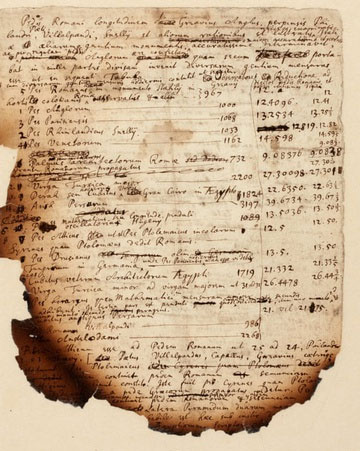Unpublished documents show Newton studied pyramids, religion and doomsday prophecy, according to the Guardian.
Isaac Newton is the British scientist, considered the greatest and most influential in the world. He is famous for the theory of gravity things.
However, mathematics or physics are not the only areas in which Newton is abandoning his research. 200 years after his death, it was discovered that Newton was also studying alchemy and theology.
Unpublished documents show Newton sought to decipher the Bible and the doomsday prophecy. There are three scribble pages on the pyramid, which Newton says hold the keys to deep secrets. A sheet of paper was burnt, possibly because her dog Diamond was messing around spilling candles on the table.
“This is an interesting document because it shows that Newton wanted to uncover the secret of the pyramid… They immersed readers in the deeper questions that Newton studied,” said Gabriel Heaton, research expert. His documents are being auctioned here and are expected to fetch hundreds of thousands of dollars.
Research on the pyramids was carried out by Newton in the 1680s at his family’s Woolsthorpe mansion. The scientist wants to know what units of measurement are used to build the pyramid. By determining the dimensions of the pyramid of Cheops, he was also able to calculate the circumference of the Earth.
 Newton also hopes that research on the pyramids will help him find ancient units of measure, allow him to explore the architecture and dimensions of Solomon’s temple – the context of the apocalypse – and explain the meanings. hidden from the Bible.
Newton also hopes that research on the pyramids will help him find ancient units of measure, allow him to explore the architecture and dimensions of Solomon’s temple – the context of the apocalypse – and explain the meanings. hidden from the Bible.
“He used to find evidence for the theory of universal gravity. The ancient Egyptians are believed to hold the secret of the lost alchemy. These areas are being studied today, but they are different from what Newton did, ”Heaton said.
Newton was obsessed with alchemy and unorthodox religious beliefs. He was not afraid that his faith would discredit scientific research, but that such a vision could cost him his career.
Although his fame depended on scientific and mathematical discoveries, Newton himself argued that they were secondary to the “great” studies of alchemy and theology.
“The idea of science to replace religion is modern thought. Newton did not believe that his scientific work could undermine religious beliefs … He was a man who had spent a long time prophesying the end of the world. That’s why Newton is so interested in the pyramid, ”Heaton shared.
Newton is seen as a “thorny individual, always up for a quarrel,” Heaton said. Others describe him as secretive, psychotic, hateful, cruel, arrogant, haunted and paranoid. “He thought he was a messiah, who came to save the world,” said Professor Patricia Fara, scientific historian at the University of Cambridge.


